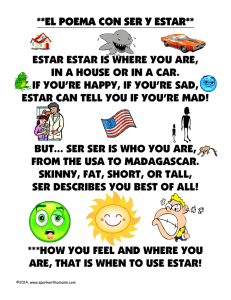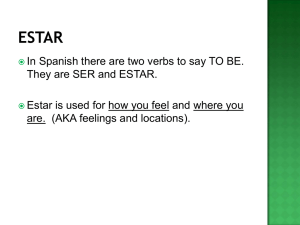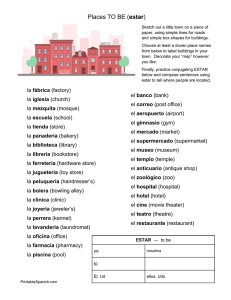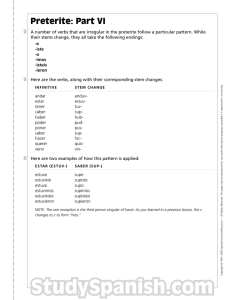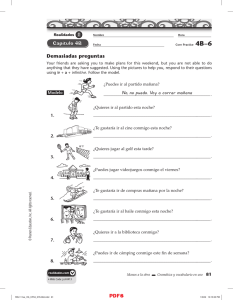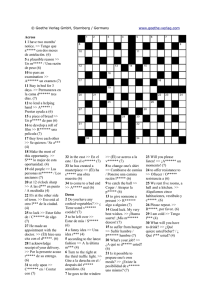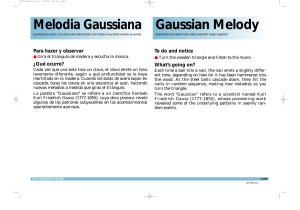INVITACIONES (3) TO EXTEND AN INVITATION ¿Quieres
Anuncio
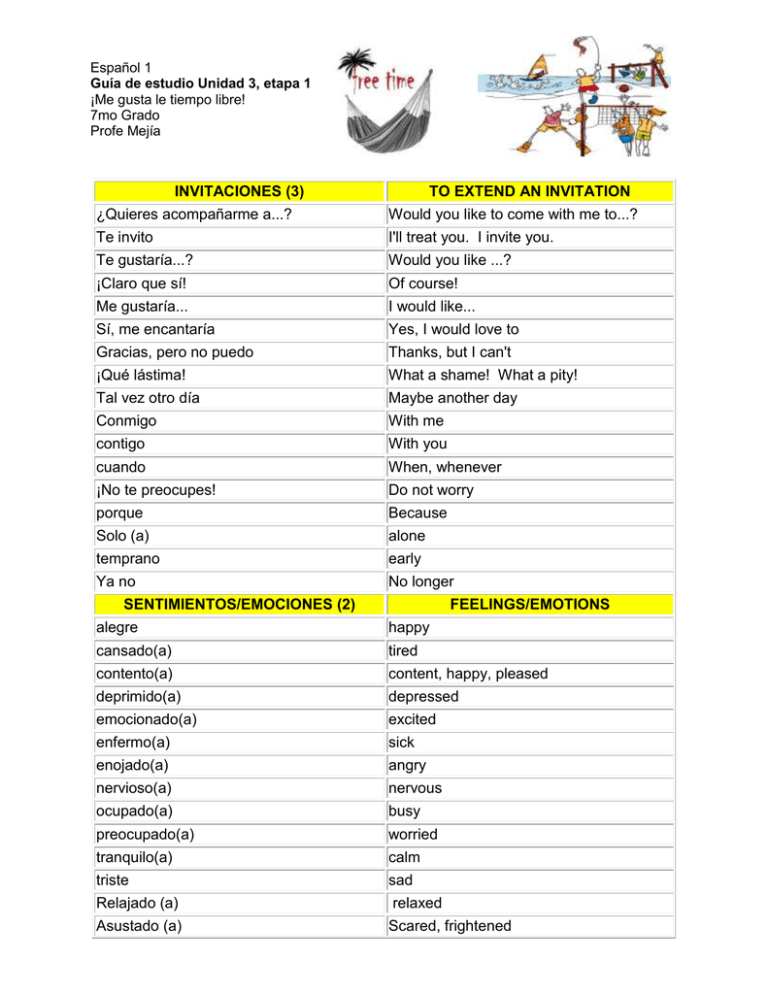
Español 1 Guía de estudio Unidad 3, etapa 1 ¡Me gusta le tiempo libre! 7mo Grado Profe Mejía INVITACIONES (3) TO EXTEND AN INVITATION ¿Quieres acompañarme a...? Would you like to come with me to...? Te invito I'll treat you. I invite you. Te gustaría...? Would you like ...? ¡Claro que sí! Of course! Me gustaría... I would like... Sí, me encantaría Yes, I would love to Gracias, pero no puedo Thanks, but I can't ¡Qué lástima! What a shame! What a pity! Tal vez otro día Maybe another day Conmigo With me contigo With you cuando When, whenever ¡No te preocupes! Do not worry porque Because Solo (a) alone temprano early Ya no No longer SENTIMIENTOS/EMOCIONES (2) FEELINGS/EMOTIONS alegre happy cansado(a) tired contento(a) content, happy, pleased deprimido(a) depressed emocionado(a) excited enfermo(a) sick enojado(a) angry nervioso(a) nervous ocupado(a) busy preocupado(a) worried tranquilo(a) calm triste sad Relajado (a) relaxed Asustado (a) Scared, frightened ACTIVIDADES EN EL TIEMPO LIBRE LEISURE ACTIVITIES alquilar un video to rent a video el concierto concert ir de compras to go shopping ir al cine to go to a movie theater la película movie, film practicar deportes to play (practice) sports el tiempo libre free time Escribir una carta To write a letter Leer una novela/un libro To read a novel/a book Ver la televisión To watch television Pasear/caminar al perro To walk the dog Pasar un rato con amigos To spend time with friends Hablar con amigos por Skype To talk with friends on Skype Textear a mis amigos To text friends Jugar videojuegos To play videogames Bajar fotos a facebook/instagram To download pictures on facebook/instagram Navegar en la red To go online ir al parque To go to the park EN EL TELÉFONO… (4) ON THE PHONE… contestar to answer dejar un mensaje to leave a message la guía telefónica phone book la llamada call la máquina contestadora answering machine Marcar to dial el teléfono telephone Deje/a un mensaje después del tono Leave a message after the tone Dile/Digale que me llame Tell (familiar/formal) him/her to call me ¿Puedo hablar con...? May I speak with...? Quiero dejar un mensaje para... I want to leave a message for... Regresa más tarde He/She will return later Un momento One moment del (contraction of de + el) from the / of the venir to come acabar de (+ infinitive verb) to have just (done something) Unidad 3 - Etapa 1 Grammar Summary Expressing Feelings with ESTAR and Adjectives You have already learned that the verb estar is used to say where someone or something is located. Estar is also used with adjectives to describe how someone feels at a given moment. A Note About ser and estar One of the hardest things to keep straight for new students of Spanish is when to use ser and when to use estar because they both mean “to be”. To remember the difference between SER y ESTAR, one must memorize their uses: E - estar L - Location F - feelings S – ser T – time O – occupation/ origin P – personality/ Physical descriptions PRACTICA: Fill in the blank with the correct form of the verb ESTAR and emotion/ temporary condition. Use the feeling in the vocabulary section. 1- I am sad: ______________________ 2- You are happy: __________________ 3- We are tired: ____________________ 4- You all are sick: ____________________ 5- She is scared: ______________________ 6- He is excited: ______________________ NOTA GRAMATICAL : WHEN & IF CLAUSES… Like in English, Spanish also makes use of conditional clauses using “if”, “when”, etc. As in the examples above, conditional clauses usually have two sentences where one of them depends on the other. [ if= si / when= cuando ] When cuando is not used as a question word, it does not have an accent. Ejemplo: ¿Cuándo estas nervioso? -- Estoy nervioso cuando tomo un examen importante. 1. Cuando vemos una película muy divertida, ____________ ______________. 2. Cuando haces mucho ejercicio, __________ ______________. 3. Si mi amigo saca una mala nota, él __________ muy ____________. Extending Invitations To extend, accept, or decline and invitation it is necessary to know the lingo. Practice & memorize the phrases given in the vocabulary section. Complete the following invitation and corresponding acceptance (or declining): Ana: Hola Marta, te invito a caminar por el parque, ¿quieres _acompañarme_? Marta: ¡ _Claro_ que sí, Anna!, ¿Cuándo? Ana: ¡ Ahora _mismo_, chica. ¡ Vamos ! José: Hola Juan. ¿te gustaría venir conmigo a un concierto? Juan: Caray José, me encantaría pero hoy no puedo porque tengo que estudiar mucho. José: ¡que _lástima_! Talvez otro día entonces. Write a response to these invitations: 1. ¿Te gustaría ir de compras? _____________________________________________________________________ 2. Te invito al concierto mañana. __________________________________________________________________ 3. ¿Quieres acompañarme al cine? ________________________________________________________________ 4. ¿Quieres ver un video conmigo? _______________________________________________________________ Saying What Just Happened with acabar de + infinitive PRACTICE IT: 123456- I just bought a new dictionary - _______________________________________________________________ My friend and I just came from school - _______________________________________________________ Joe and Alex just ate lunch at the cafeteria - __________________________________________________ She just finished her homework: _______________________________________________________________ You and Raul just rent a video from Red Box: _________________________________________________ Our class just watched a video: _________________________________________________________________ El verbo VENIR - to come (to, from) Venir is similar to the verb tener. Venir also has the same (e-->ie) spelling change as tener. The only difference is venir is an -IR verb and so has the letter i in the nosotros and vosotros forms. To say where you are coming from use VENIR + de + place // To say where you coming to use VENIR + a + PRACTICE IT: 1- ¿de dónde ____________________ tú ? -- yo ____________ del cine. 2- Acabamos de alquilar una película. ________________ de la tienda de videos. 3- Roberto _______________ a Puerto Rico para vivir. 4- Diana acaba de comprar ropa. Ella _____________ de la tienda. REVIEW: Using gustar + Infinitive You already learned how to use gustar to say I like, you like and he/she likes to do something. Now you can talk about what other people like to do: NOTAS CULTURALES Y OTRAS COSAS EL MORRO is a fortress that the Spanish began in 1539 and finished in 1787. How could such a fortress protect the city of San Juan? LOS TAÍNOS were the people living on the island when Columbus arrived in 1493. They left these glyphs. Their language survived in words like huracán (hurricane). What other Native American cultures can you name? LA MUSICA: La bomba y la plena are tradicional dances of Puerto Rico. Both have African roots. The instruments used to play this music are tambores (drums), panderetas (tambourines), maracas, and el cuatro (small Spanish guitar) EL LORO PUERTORRIQUEÑO became an endangered species in 1971, when only twenty of these parrots were left. Their numbers have now increased. You might see one in El Yunque, the tropical rain forest. What other animals have been saved from extinction? FOODS from Puerto Rico include tostones, pernil and pasta de guayaba. Tostones are sliced, pressed, and fried plantains. Pernil is a dish made with roast pork loin
